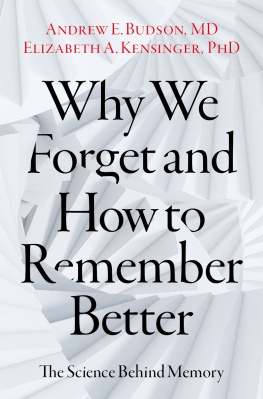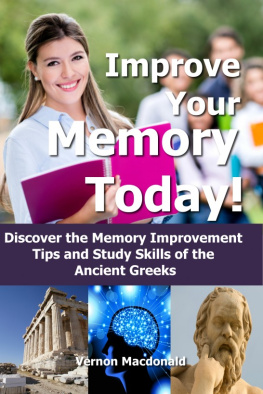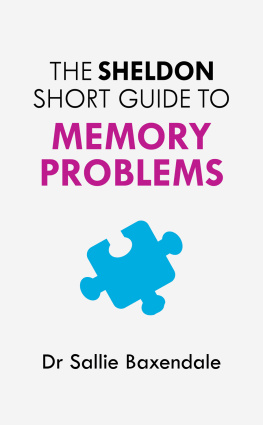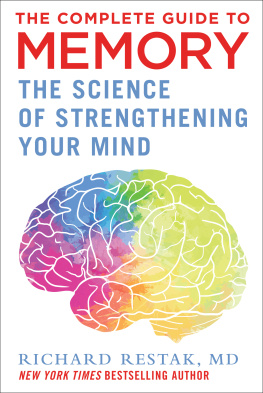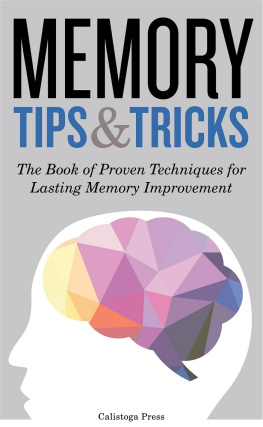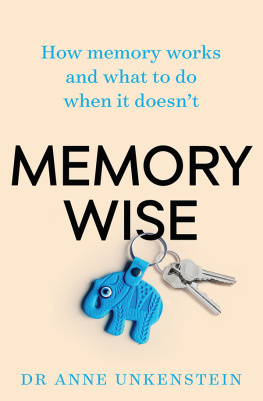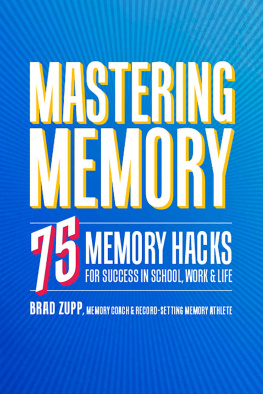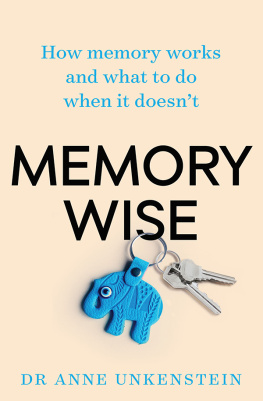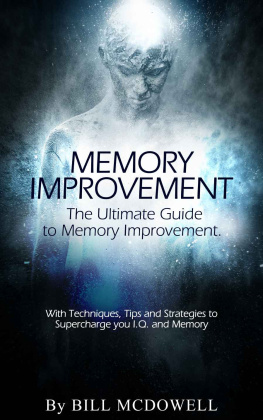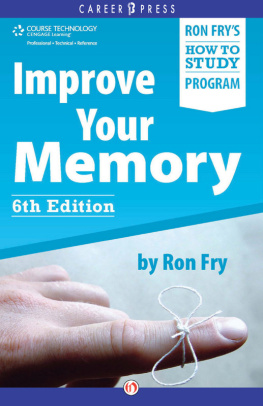To U3A (University of the Third Age) for the wonderful
way they promote ongoing challenge and the joy of
lifelong learning to people worldwide.
Contents
Writing this book in collaboration with my daughter Janet has been a journey of great joy. I have moved from being often in a state of worry over my many small slips of memory and dread of possible worse to come, to a position of interested spectator as well as chief custodian of my memory system.
Janet and I live 1000 kilometres apart and keep in touch by phone and email. By these means she would often share with me her excitement over her latest reading about the working of the brain. We began a series of question and answer correspondence over my memory lapses, with my worrying diminishing in importance the more I knew about it. The final result was the writing of this book.
We hope that its readers will feel pride, as we do, in being the owners of such a marvellous contrivance as the human memory system, and gain understanding of how to tend it with care and be gentle with its occasional lapses.
Judith Wiles
My mother always had a good memory. When she started worrying about her memory failing, the family used to joke that she was just having trouble getting used to living with a normal memory system. Learning about memory changed her life. What began as a simple conversation between the two of us about memory grew to be a fascination, prompting a survey about other peoples concerns. Answering the concerns of the survey respondents grew from a report, to a paper, then got out of hand and grew into this book. We hope that it will be of interest to anyone who has wondered which of their 1000 billion brain cells mislaid the car keys.
Janet Wiles
Memory has an enduring fascination for many people, ourselves included. New research and interest in learning about memory has continued unabated since our survey of the memory concerns of older people over a decade ago. The most exciting news we reported in the first edition of The Memory Book was that the brain can make new brain cells, and more connections between cells, even in older brains. The encouragement of knowing this has energised many people to learn more about their own brains, and what they can do for their own memory systems.
Updating the book for the second edition has highlighted the amazing advances in memory research. In the past five years alone, tens of thousands of studies have been published on memory, with more than 600 of them contributing to our understanding of new brain cells. There is a growing appreciation that much of what happens in our brains is the result of lifestyle choices that are under our own control. Brain fitness matters, both physically and mentally. The most effective thing we can do for memory is physical exercise. When you know that exercise is part of the process of making new brain cells, you become much more motivated to get some aerobic exercise each day. Every little bit of exercise that raises a puff will help to blow the fog away.
Since the first edition of The Memory Book was published, we have experienced at first hand more of the things that the Memory Survey respondents were writing about. In the many seminars and interviews that weve given in the past ten years, people have told us that learning about memory changed their lives. It continues to change ours. We learned much in researching and writing the book we exercise more, eat more brain-enriching food and value sleep more. We also take life a little less seriously, we try to be well organised and forgive our memories for their minor lapses. We also ask for a slow repeat when a phone number is rattled off in a single stream.
For new readers we hope that the journey of learning about memory will be an exciting one, and for returning readers we hope you will find the new research fascinating and insightful.
Judith Wiles and Janet Wiles
I name this ship
I name this land
I name this child
The ceremony of name-giving is an occasion of importance and it is an honour to be asked to bestow a name. Only certain people, such as the parents of a child, may actually choose the name, and sometimes traditions decree who the child will be named after. So here we are, as adult people, with a name that defines us, and yet that name is an arbitrary label. Surely we would be the same people had we been called some other name. A name is not intrinsic to us. It is not literally part of us like a foot or a face. The paradox is that although we would still be the same person with a different name, we learn to identify ourselves by it and build our personalities around it.
Since calling others by their name is an important part of our social and business life, we would like to remember peoples names. Almost everyone has experienced being in a situation where they know the name of a person but cannot bring it immediately to mind. Frequently this lapse occurs when the person has not been seen for a while, but it also happens for names of close friends and even family, or for somebody met only minutes ago. Why are names so hard to remember? The arbitrary association between a person and their name provides a clue to our difficulty in remembering names and bringing them to mind at will. If words form a sequence like left and right or warm and cosy, they come easily to mind. One word calls up the next. But a person and their name are two discrete entities and we need to deliberately create associations between the two.
Funny things can happen when other people forget your name. Helen recounts her story:
At our local shopping centre a woman rushed over and said how lovely it was to see me and continued to chat for about 5 minutes. The whole time I was racking my brains trying to remember who she was I was searching for clues in everything she said. She finally said she had to be off and said, good bye Susan see you soon I hope. My name is Helen!! What a relief she didnt know me after all!
THE MEMORY SURVEY
To find out how concerned people were about their memories, we designed a short Survey on Memory. Judiths local region of the University of the Third Age (U3A) kindly agreed to include our survey in a mailout to their members. Very soon our letterbox was crowded with replies, and they continued to arrive for months.
The Memory Survey began by asking, Have you noticed any memory lapses in yourself? and if so What things do you forget? Most survey respondents (97 percent) reported forgetting something. With mixed chagrin and good humour they described their lapses of memory, what memory issues interested them, what they could be philosophical about and what baffled or worried them.
The most frequently reported memory lapses were:
| Forgetting names of people and things | 179 responses (65%) |
| Things to do, such as make phone calls, remember birthdays | 77 responses (28%) |
| Automatic actions, such as whether doors were locked; irons and stoves turned off; where keys, glasses, umbrellas or cars had been left | 58 responses (21%) |
Other difficulties mentioned were past events, finding the right word, phone numbers, passwords, PIN numbers, information read, and words of a new language. Three per cent of survey respondents reported no memory lapses but, interestingly, only a very few claimed perfect memories. Most of this 3 per cent reported highly effective strategies for organising their lives.
Next page

